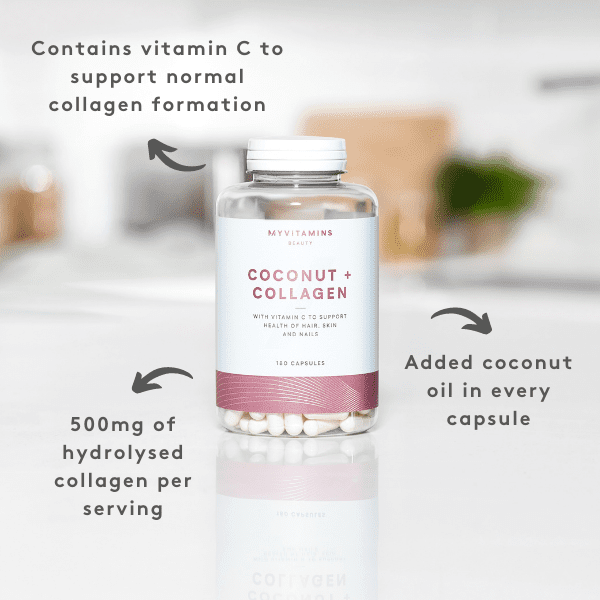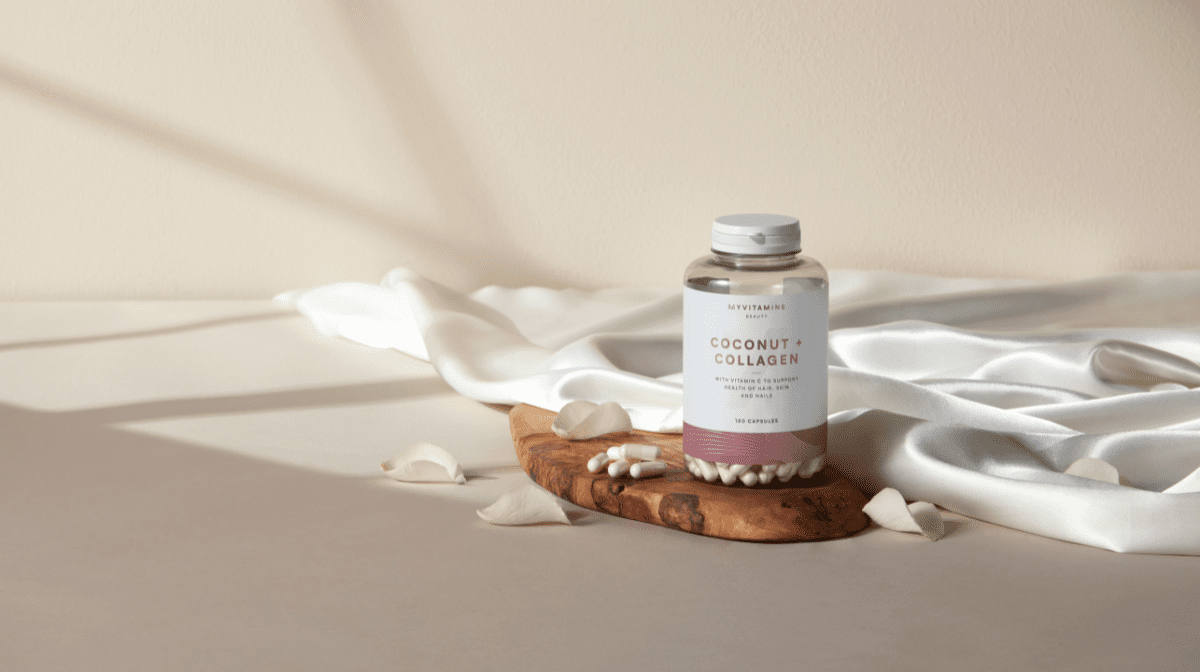A beauty bestseller, our Coconut & Collagen Capsules are an expert blend of coconut oil, hydrolysed collagen and vitamin C. From the age of 25, our natural ability to make collagen begins to decline. These high-quality supplements are a convenient way to top up your levels from within.
In this article, you’ll find:
- What Is Collagen?
- Coconut & Collagen Benefits
- Why Do I Need Collagen?
- How Much Collagen Should I Take?
- Collagen Rich Foods
- How Do I Know If I’m Lacking Collagen?
What Is Collagen?
When the body breaks down dietary proteins into amino acids, collagen is made. Once formed, this protein provides our skin, hair, joints and other connective tissues with structure.
There are 28 different types of collagen in the body, with type I being the most common in skin. As we get older, our declining collagen levels result in a reduction in skin elasticity. This is what causes visible signs of ageing including wrinkles and fine lines.
Coconut & Collagen Benefits
Each serving of our Coconut & Collagen Capsules contains:
- 500mg hydrolysed collagen – A broken down source of collagen that’s easy for the body to absorb.
- 80mg vitamin C – An essential nutrient that supports normal collagen formation (1) and protects skin cells against the oxidative stress caused by sun damage and alcohol. 2
- 250mg coconut oil – A natural skincare ingredient rich in medium-chain triglycerides, that’s been linked to various health benefits.

Supports Bone & Joint Health
Collagen plays an important role in joint flexibility and strength. A recent study showed that adults who took collagen supplements, (2 grams of collagen for 70 days,) saw a significant reduction in joint pain. 3
Increases Muscle Mass
Collagen is the most abundant protein in the body and is found in all muscle tissue. Protein is vital for maintaining the growth and muscle mass, (4) meaning it should be in our diet daily.
Maintains Skin Health
As one of the major building blocks of skin, collagen is found in the dermis and helps skin cells to stay firm and rigid.
Research shows that daily supplementation of collagen (over 69 days) improves skin elasticity and hydration. 5
Supports Healthy Hair & Nails
Some of the amino acids found in collagen (most notably proline) are used to build keratin. As another important protein in the body, keratin is responsible for keeping our nails and hair strong and shiny. 6
Why Do I Need Collagen?
Like all proteins, collagen plays a vital role in several processes in the body. Without enough collagen, our skin cells cannot heal wounds, our joints can become weak and our hair can become brittle.
How Much Collagen Should I Take?
There’s no specific limit to the amount of collagen we can take, but it’s important to check the other ingredients in each supplement to ensure you’re not exceeding vitamin and mineral recommendations.
Collagen Rich Foods
Whilst supplements are a quick and easy way to support your protein levels, collagen is also found in foods including:
Bone Broth
Both chicken and beef broth make a great source of collagen. The bones must be simmered in water before the broth is extracted and bone quality must be high to ensure maximum collagen percentage.
Fish
Marine collagen is found in up to 1.4% of fish muscles. Cod, salmon and herring are all rich in this protein. However, the parts of fish with the highest levels of collagen aren’t usually eaten. These include the eyes, scales and head.
Chicken
In a similar way to fish, the unpopular parts of a chicken contain the most collagen. These include the feet and the skin. Along with type II collagen, these parts of a chicken are rich in chondroitin and glucosamine, two joint cartilage compounds.
Eggs
The membranes in eggs contain proline, one of the main amino acids found in collagen and keratin. 6
How Do I Know If I’m Lacking In Collagen?
Without enough collagen in our diet, we can suffer from a whole host of symptoms including weak joints, slow healing wounds and thinning hair.
Wrinkles
The most notable physical sign of low collagen levels are wrinkles or creases in the skin. Collagen fibres lose their elasticity and fine lines being to appear as plumpness in the dermis is reduced.
Joint Pain
Cartilage is a flexible tissue that helps our joints to slide along one another during movement. It also acts as a shock absorber, protecting our bones when we jump or exercise.
The cartilage in our joints is weakened when collagen levels drop. This makes movement stiff and painful.
Slow Healing Wounds
An injury to the skin triggers a healing process in which collagen plays a huge part. First the blood vessels tighten to restrict blood flow and encourage a clot. Skin cells multiply across the wound and collagen begins to grow, pushing the edges to shrink together and close. Over a period of months or even years, the body increasingly adds collagen to the area, letting a scar form and then heal. 7
Without enough collagen in the body, wounds can be slow to heal and this can cause infection, pain and other more serious symptoms.
Take Home Message
Without enough collagen in the body, our skin, hair, joints and muscles can become weak and lack structure. Whilst collagen can be found in various food sources, the extraction process can be lengthy and the highest levels are found in animal products. Supplements are a convenient way to maintain your intake anywhere, anytime.

